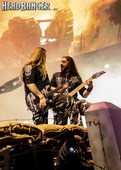Sabaton
We Try To Stay Away From Politics And Religion
02.03.2020
Архив интервью | Русская версияAs we predicted last year, with the release of their most ambitious effort to date, “The Great War”, Sweden’s Sabaton received more acclaim than ever, topping the charts not only in their home country, but also in Switzerland and Germany. And in Russia, they are about to embark on their biggest tour so far, which will take them all across the country from Yuzhno-Sakhalinsk to Krasnodar over a period of 25 days. Fans should be running to grab their tickets now, as quite a few of the shows are already sold out or close to being sold out, and on your way to the box office, you might as well read our chat with singer Joakim Broden, who told us what to expect from the upcoming shows and shared more details about the band’s intense touring and songwriting routine…
The latest news from the band is the video from “Seven Pillars of Wisdom” video which was shot in Tunisia. Apart from the unfortunate car crash, what are your impressions from visiting the country?
(laughs) I gotta say it’s a really beautiful place, I mean, the Sahara Desert. However it’s a very hostile place as well. When we were sleeping, we were battling everything from cockroaches and spiders to scorpions in our tents. (laughs) But all in all, except for the car crash, I gotta say I really loved it. The food was great, for example.
Videos seem to us a very important part of what Sabaton are doing, and you invest a lot of effort and money, we guess, in them. Is there anybody in the band who is responsible for the visuals, who decides like, “in this video we do this and that”, “for the filming of this video we go to Tunisia”, etc?
Well, in the production part, I would say, Par (Sundstrom, bass) is the most involved one. It’s a lot of bouncing with him. Of course, everybody in the band will read the script or idea before we go and do it, but he is the one who is constantly bouncing ideas. Obviously, the director we work with is gonna have the final say on what kind of camera angles he will use and everything like that, we don’t get involved in it. There’s a reason – we do music. (laughs) Me personally, I fucking hate doing music videos. (everybody laughs) However I figure if we’re gonna do them, we might as well do them damn good. Just going into a room with a green screen – which we have, which we can do, of course – fuck this, it feels like I’m pretending. Now I spoke my thing, but in this case, if we discount the car crash, broken ribs (laughs), injuries, stitches and everything, we got to see the Sahara Desert. So yeah, fuck the video recording in the 50-degrees sun blowing down your throat, it was a nice experience to have been to the Sahara Desert.
Speaking about travels, you will be doing a Russian tour in March, which will be the biggest for Sabaton in this country so far. What surprised us is that the tour was announced in May last year, which is 10 months ahead of its dates. How does the band feel when your life is planned and contracts are signed for so many months in the future? Is it difficult to actually follow such a far-reaching schedule?
Yes and no. Actually the European tour that will start one week from now – the announcement was over 12 months in advance, but we had been planning that for six months before that. So we knew a year and six months in advance not exactly the dates, or exactly the cities, but we knew that from mid-January to mid-February we would be doing a European tour. Of course, it could feel like your life is painted up in front of you, but on the other hand, it is nice. Let’s see - now we’re going for the European tour for one month, then we have two weeks at home, then we go for one month to Russia, and then we don’t have anything for a month and a half. I don’t have to wait for a holiday, I don’t have to wait for anything – if I want to do something, I can do whatever the fuck I want. That’s a luxury in a way. With everything bad that comes, there is usually something good to be found, if you look good enough. Yeah, we are very busy, we are on the road all the time, however, when we are actually at home, we are very free to dispose of that time. In many cases, I’ll end up in the studio writing music anyway, and Par working with the business side of things. (laughs) That’s our problem.
What shall your Russian fans expect from your upcoming shows? How they will be different from the ones you’ve played here before?
Well, we’re gonna have a bit longer time, we’re gonna do an hour and a half, while the last time we only did 60 minutes, I think. We will do an hour and a half, that’s the plan at least. We obviously have a new album out, so there will be new songs from that, and we’re gonna try and dig up some more songs that are relevant to the Russian military history. Which is sort of nice for us, because if we play in the Czech Republic, they’re gonna want to hear the song “Far From The Fame”, which is about Karel Janousek (WWI Czech air force officer – ed.), and if we play in Russia, people are gonna want to hear “Panzerkampf”, which is about the Battle of Kursk. Obviously, for Russia we also have “Night Witches”, we have “Attack Of The Dead Men” now, and as we are playing in Volgograd, we’re gonna dig up “Stalingrad”, I think. (laughs)
Last year you did a very big show at Wacken Open Air, where you reunited with a lot of former Sabaton members. Could you tell us a bit about how this concert was put together? Was it easy to get everyone involved?
It was pretty easy. Things were a bit frosty when we went separate ways, but everybody is happy that it happened the way it did. I mean, nobody hates each other. In general, I have no real contact with Oskar (Montelius, original guitarist), for example, but neither we did before the band, that’s the way it is with some band members. Some band members, you are friends with forever, even though they’re no longer in the band, and some band members - you realize when they are no longer in the band that you had nothing else in common with actually. The only things you had in common were the band and the music. For example, Daniel Mullback, the old drummer, and me, we’re in touch every now and again. But with Oskar I have barely spoken to, I have only seen him two times since we went separate ways, because he does something different, he doesn’t even play music anymore. There’s a different situation with every band member, I guess, but with the ones who were there, there was no trouble. They’re all close to us anyway, because we spent so much time together touring. When we came up with the whole idea… Par called me up like a year before the Wacken show, or maybe even more, a year and two months, and he said, “Wacken wants us to headline”. I was like, “Yeah, cool”. And then he said, “Can we do two stages, can we do anything special? I saw Trans-Siberian Orchestra and Savatage two years earlier, they did two stages”. I said, “Yeah, sure, let’s do it”. Par said, “But what do we do on the other stage?” I said, “Maybe let’s bring in some old members. Let’s call Tobbe (Englund, guitarist), who was in the band until 2016, and let’s call Rikard (Sunden), Daniel and Daniel (Myhr), the old guitarist, drummer and keyboard player”. Par was a bit surprised at first, because he thought it would be Sabaton looking backward instead of forward, but I said, “Yeah, if we do it like Kiss and bring all band members back when nobody wants them! They don’t want that, we don’t want that, but I think everybody will have a good time doing Wacken again together - because we did it in 2008 with the old line-up. The new line-up has played there twice – in 2013 and 2015, so hey, let’s give the fans something they’ll never forget and make sure we record it so fans can catch it, and make it a huge surprise for everyone”. I think it worked out fine, it was a lot of fun.
You mentioned that the show was recorded, so are there any plans to release it in the future?
No, it’s free on the Internet.
Oh, just that? And there’s not gonna be a DVD or anything like that?
Oh, maybe we’ll do something in the future, but it feels like why should we try and sell something that’s available for free anyway. The contract for the streaming thing is valid for a year or two, so maybe if people want it five or ten years from now – yeah, sure. But to do it nowadays makes no sense.
Another big show you did last year was at Hellfest, where you played not one, but two sets, replacing Manowar at the last minute. That show was also special, because you had troubles with your voice…
Yeah, that was fucked up for sure. (everybody laughs) We were playing Knotfest, the Slipknot festival the day before Hellfest. It’s in the same area, they basically borrow the festival area from Hellfest. We played the show, everything was fine, and we were gonna stay the next day to do media – interviews and stuff. And then we wanted to see Manowar (everybody laughs) – we had two days until the show at Graspop in Belgium. I woke up the next morning and I felt like, “Oh, I’ve really got a sore throat”. But to be fair, that happens to me 10 or 15 times a year - I just shut up during the day, I warm up two hours before the show, and it’s fine. However that day about half an hour or 20 minutes before the show I totally lost my voice. I was like, “Oh shit!” With the history of waking up with almost no voice but being able to sing in the evening – I lose my speaking voice before I lose my singing voice – I wasn’t worried at all, and nobody else was in the band. And then we realize it’s fucking too late. First Manowar cancel one day in advance – we can’t cancel 20 minutes in advance. I took a setlist from the wall, I gave it to Tommy (Johansson, guitar) and Chris (Rorland, guitar), and I said, “I’ll do the first three, mark the ones which you are singing”. They’re like, “What the fuck?! We can’t sing! We don’t know the lyrics!” “I’ll go and print them right now. Mark them up for me!” They were panicking a bit - “What the fuck? Are we gonna sing lead AND play the guitar?” “Yeah-yeah, absolutely! (laughs) There’s no way we’re cancelling now!” It would have been a different thing if we had known about this situation when we were asked by the promoter. Then we would have said no, of course. But in this situation we just said, “We’re gonna make a show happen and entertain people even if I can’t sing”. I did the first three songs, and halfway through the second song I was growling or doing something like Dani Filth from Cradle Of Filth. I told the crowd, (in a hoarse voice) “Sorry guys, my voice is fucked, but we don’t wanna cancel, so give it up for Chris and Tommy”. We had a midsummer celebration, it’s a Swedish holiday, so we had traditional Swedish food, we invited some fans on the stage where we had a table with this food. I joined them for a party, had some food and some drinks, then I would go and change the lyric sheets, so Chris and Tommy would have them on the monitors, and I would jump out at some parts where there is audience interaction and talking to the crowd. It didn’t turn out as good as it should have if I had sung, but on the other hand, whoever came got a fucking unique show, for sure!
Now a question about upcoming touring – you will be teaming up with Apocalyptica for a joint tour, and you will be playing a few songs together at every show. Have you already decided which songs they will be?
Our setlist is going to change a bit depending on which country we are in, as I said earlier. When we’re playing in Finland, they wanna hear about Finnish history, when we’re in Germany, they wanna hear songs about German history. That would change a bit. With Apocalyptica, that part will be – unless something doesn’t work out, then we’ll rehearse something else; if the crowd hates it, then we’ll change it, but if things work out good, we’ll do “Angels Calling”, which we already did together with them on the recording, “Fields of Verdun” that they already did, then since it’s about World War I, “The Price Of A Mile”, and then because it’s got a cool orchestral intro, we’re gonna do “Lion From The North” with them. Then there’s one more – which one was that? Hmm, I don’t remember.
No problem, we will see very soon! Speaking about “The Great War”, it’s an album fully dedicated to World War I, which was a huge event, but the album itself is not very long, only about 40 minutes. Shall we expect “The Great War Part II” from Sabaton one day, or have you said everything you wanted to say about that war in these 11 songs?
No. We had to abandon so many ideas. Even if we did 10 albums on World War I… Maybe we covered the most important ground, but we could have made three albums, and we would still miss some of the important stuff. Especially after we made an announcement about this and after people heard it, we would get emails, “Hey, why didn’t you make a song about this?” and we’re like, “Oh fuck, I’ve never heard of that, it’s such an amazing story!” (laughs) So yeah, I would like to one day revisit those events, I don’t know in what form – in a simple song or an album or whatever. I can’t make any promises, but I would love to go back and do at least a few more songs, because some of my favorite topics that I wanted didn’t even make it.
How was the decision-making process on topics going like then?
We knew except for one song or two that we’re making an album about World War I, that was on my mind whenever I was writing music. Sometimes I only knew it was about World War I, another time, when I did music for “The End Of War To End All Wars”, the second to last song, I knew that I wanted to tell the story about World War I standing on the Armistice Day, November 11 - the fighting has stopped, and you look back on the past four years and you think of what’s happened. I knew that when I was writing the music - I didn’t know the lyrics yet, but I knew what I wanted to say. For the rest of the stuff, we had something between 80 and 100 ideas that could have been on the album. But it’s really important to us that the music and the lyrics speak the same language emotionally. When me and Par are sitting and listening to the songs, in many cases with vocal melodies or at least guide – not exact, of course, but I’d written vocal melodies already, sometimes even sung random vocals - we think, “Well, what feeling do we get?”, and we look at all these ideas, “Oh, it could be perfect if in this song we told that story from that point of view!” And if we both like it, then we do it. That’s pretty much how most of it comes together, but on every album there’s one or two songs that you can’t find the right story to, and it all comes together in the last moment. On this album I was gonna sing a song in five days, and I still didn’t know what it was about, but then I came across the story of Francis Pegahmagabow (the most effective sniper of World War I – ed.), and that song became “A Ghost In The Trenches”. It was like – click – “Yes, this is the one!”
Here in Russia, when people talk about wars, even those that Russia wasn’t involved in, they very often take sides and present the story like “good guys against bad guys”. In Sabaton, your songs are much more impartial or objective, so to say, it’s not like you side with the Triple Entente or the Triple Alliance on “The Great War”. Our question is: does it come natural for the band, or do you sometimes have to hold yourselves and say, “Oh, we can’t express our opinion too much”?
It's a bit easier when you’re Swedish, and you haven’t been on a major war since the 1700s! Also we are controversial enough as it is. We try to stay away from politics and religion, of course, because people get very excited about those topics for obvious reasons. But we find history so interesting that sometimes I don’t give a shit, I become so passionate about a story that I don’t care about political consequences of singing about Slobodan Milosevic from his point of view, or from his side of the conflict, as we did with “We Burn” - Par did the lyrics for that one, actually. If it’s a good story that fits perfectly with the music… We’ve had songs in which we switch sides, if you know what I mean, lyrically. We’re telling the story from a point of view, we’re not telling what we think. Maybe it’s from that soldier’s or that commander’s point of view. I think so many people have used music to deliver a political message that people are looking for one when there isn’t one. With filmmaking it’s more accepted that there is no message, it’s just a film, they’re telling a story. That is sort of what we’re doing with our music – we’re telling stories, and we’re telling the stories the way we find them most interesting. We don’t say right or wrong, we say, “Hey, this happened, and this is a cool way we can tell you this story”. Sometimes it’s a really controversial way of telling a story – we spoke about how Hitler came to power, we spoke about genocide and all kinds of things. People are asking us, and it’s normal, I don’t mind people asking. But at the same time I’m saying: OK, yeah, we did a song about Nazis – yes, we did, several of them. And If you ask me if I’m a nazi – fine, no, I’m not a nazi. However, ask yourself this: Steven Spielberg did a movie called “Schindler’s List”. Would you ask him if he was a Nazi? (everybody laughs)
Your Sabaton History Channel has been on YouTube for nearly about a year. Are you satisfied with the results it has achieved? And do you have any plans to release these videos on any physical media?
Oh, I don’t know actually. To be honest, we were really happy in the beginning, because it was growing really fast, and people were sharing it really fast, which is really good. But then it sort of stopped. I don’t know, but it’s not growing as fast as we were hoping for. We’re still on the underside of not making money, but it’s being able to sustain itself, because there’s a lot of people, there are between 8 and 12 people involved in every episode, doing filming, editing, translation, graphics… We were hoping at least that this could sustain itself, so we could so it forever. However it sort of stopped. I don’t know whether people got less passionate about it over time or people just got used to it, it wasn’t new anymore. Or it could be something with the format – it’s too lightweight, I guess, for hardcore historians, people who are really into history, but it could be too advanced for people who are casual into history. I don’t know actually. We love doing it, and at least we’re gonna make it past one year, and then we’ll see.
What are your favorite history books or movies? I mean, quite a few people don’t find history very interesting – what would you advise them to read or watch to get excited about this subject? Apart from listening to Sabaton, of course.
(laughs) I would say both the book and the TV series, “Band Of Brothers”, I find it very good. Steven Spielberg and Tom Hanks produced the TV series, 10 one-hour episodes, emotionally very good, I think, really a milestone in storytelling that is also true. It’s a little bit Hollywood-ized, but just a little bit, that’s cool as long as you’re not shielding the stories or anything.
You have appeared as a guest singer on quite a few albums by other bands, and sometimes these bands are from quite remote places, such as Desert from Israel or Wisdom from Hungary. What does it take for a band to have you as a guest singer on their record?
(laughs) A bit of luck or to be my friend. I’ve been offered a lot of stuff, guest singing in projects and stuff, but usually it’s like, “Yeah, if you do it, we can give you this and this much money for a song”. I’ve never really accepted any of that. In case of, for example, Desert – they were friends. They took time off their work when we went to Israel for the first time, half the band are Russian Israelis anyway, so they took time off and showed us Jerusalem. Then one year or half a year later, when they were making an album, they had a song about Order 227, “not a step back”, and they wanted me to guest. I thought, “They’re nice guys, of course, send me the files, and I’ll sing it”. The same thing goes for all other guest appearances that I’ve done. Wisdom were nice guys, we were touring with them, and they asked me, “Could you come over? We have a studio next to where you’re playing in Hungary. Can you come over and sing on one song?” I was like, “Yeah, sure”. Tobbe Englund, our old guitar player, and Snowy (Shaw), who played drums with us, had me guesting on their stuff. It was fun. At the same time it’s important to know that you can’t send me an email if you don’t have any connection to Sabaton, and I’ll be able to join and sing.
Sabaton on the Internet: https://www.sabaton.net/
Special thanks to Maxim Bylkin (Soyuz Music) for arranging this interview
Interview by Roman Patrashov, Natalia “Snakeheart” Patrashova
Photos by Olga “Omena” Dendymarchenko
January 10, 2020
© HeadBanger.ru







